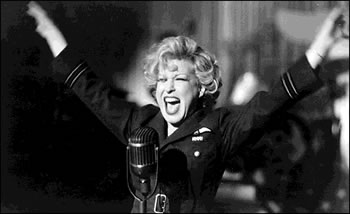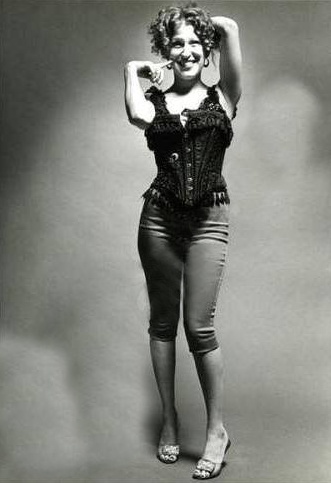The Divine Miss M
Jeff Spevak
Staff music critic
Rochester Democrat and Chronicle
(October 4, 2004) —
OK, Bette, which would you rather do: Make a new film, record a new album, or cast the deciding vote that pushes George W. Bush out of office?
Showing no regard for her personal career, the Divine Miss M answers without hesitation: “I would like to cast the deciding vote.”
Bette Midler is many things. Singer, actor, comedian. Brassy, funny, fearless. Her audience will discover this just after 8 p.m. Tuesday, when she takes the stage at the Blue Cross Arena at the Community War Memorial. On a stage set that recalls a vintage Coney Island carnival, Midler is the wildest ride on the midway.
Did we mention activist? In a week in which some of rock’s biggest names — Bruce Springsteen, R.E.M., the Dave Matthews Band, Kenneth “Babyface” Edmonds and Bonnie Raitt — are playing anti-Bush “Rock For Change” concerts in key swing states, Midler has beaten them to the punch-card ballot. When her “Kiss My Brass!” tour came to Buffalo’s HSBC Arena in March, her between-song patter (and Midler patters a lot) was almost completely consumed by comments ridiculing the Bush administration. Considering that the 58-year-old Midler’s biggest hit was the saccharine ballad “Wind Beneath My Wings,” it’s no large leap to assume her audience is comprised of quite a few middle-aged, conservative-minded Republicans.
But Republicans are people, too, Midler says.
“I think my audience is humanist,” says Midler, who emphasizes her words as though she were speaking in italics. “I think my audience likes human beings. Plenty of Republicans think we’re going the wrong way. Plenty of Republicans realize this is a tough time, and it’s time to step up to the plate.”
Midler always comes out swinging. She’s an icon in yet another group that Bush is going to war against, the gay community (you’re probably wondering: Midler’s been married since 1984, and has one daughter). She’s also a founder of the New York Restoration Society, which raises funds for the city’s public spaces. And she’s played a series of assertive women in films that include The Rose, Down and Out in Beverly Hills and The First Wives Club.
These appear to be the same women as the one onstage telling jokes that could be easily categorized as vulgar.
“Are you kidding me?” Midler howls into the phone. “I thought they were too old!”
Midler is reminded of a joke she tells of a stroll along the beach: There is simply no way to present it in a family newspaper.
“Oh, yeah, that one’s almost over the line,” she admits. “I really feel I walk a very delicate line, and I feel I do it gracefully. My show is wholesomely bawdy.”
She applies a voice that’s equal parts soaring and sassy to songs that range from the Andrews Sisters’ “Boogie Woogie Bugle Boy” to an elegant “Shiver Me Timbers” by the iconoclastic Tom Waits. “Oh, I worship Tom Waits,” says Midler. “I think he’s a genius.”
But the main man in her professional life, the man behind her latest album, Bette Midler Sings the Rosemary Clooney Songbook, is a dreamer.
“Barry Manilow said he had a dream that we should do it,” Midler says. “Rosemary had recently passed, and we both knew her. She had such a remarkable voice. When I was a very, very small child, I remember sitting listening to the radio, listening to her voice. These songs become very meaningful when you associate them with your childhood.”
Manilow was Midler’s pianist in the late 1960s and early ’70s, when she was creating a style of cabaret comic and sassy jazz singer that made her a cult figure in New York City’s underground nightclubs, what was known then as the “bathhouse scene.”
“We hit it off right away, we both had the same musical sense of humor,” Midler says.
Manilow holding his own against the irrepressible Midler: It’s not a picture that comes easily to mind. She sometimes refers to him as “Mr. Manila.”
“Well, I really do bring it out in him,” she says. “I insist on it. He’s really evolved into a very spiritual guy over the past couple of years. He has compassion for all types of people.”
From iconoclastic Waits to dreamer Manilow, Midler assembles seemingly ill-fitting pieces into something that grabs your attention and holds on for dear life, like a small dog biting your ankle.
The “Kiss My Brass!” tour is not only about big attitude, it’s about big sound.
“I do love my horns,” she says. “They’re alllll Democrats. They really add a crunch to the music. It’s really an American show. It’s big laughs, a little bit of tears.
“It’s based on the old icons of Coney Island at the turn of the century, with the freak shows and all of that. Some rides are terrifying. Sometimes you gasp at what you see on the midway. But I also think it’s hopeful, because I believe America as a nation is very hopeful.”
And that’s why “Boogie Woogie Bugle Boy,” an anthem for a war whose virtues few people debated, is appropriate to Midler.
“I do think it’s very odd to be singing that song during this time,” she says. “I also did something like that called ‘For the Boys,’ which was a war movie as well.”
She wonders aloud for a moment — “It’s just odd that we still go to war … ” — before resuming.
“Those songs are just timeless in a way. It’s not war boosting, it’s troop boosting, it’s morale boosting. It’s not war mongering. Both of those songs are intended to boost people’s spirits.
“And we need it, because I’ve never been through a time like this.”






